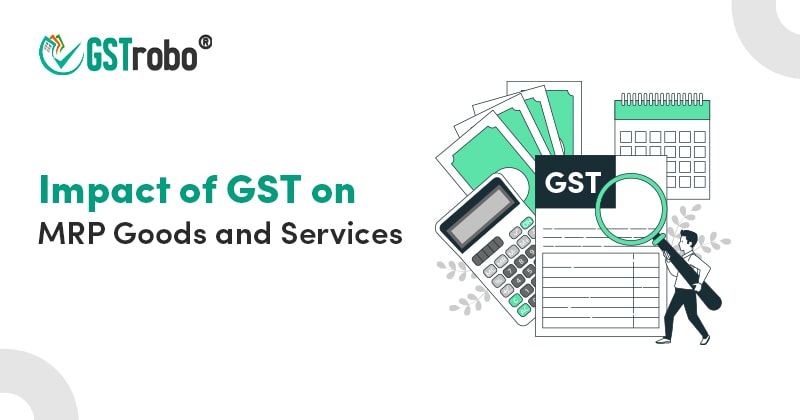Impact of GST on MRP of Goods and Services
The Goods and Services Tax (GST) has replaced the majority of India’s indirect levies. Before the introduction of the GST, companies were forced to pay tax at every point of the supply chain. The product’s price rises as a result of the cascading effect. However, under GST, a taxpayer can claim an input tax credit for the purchase of raw materials. This decreases the cascading effect on the product’s ultimate price/MRP.

What exactly is MRP (Maximum Retail Price)?
Every product has a maximum retail price labeled on it. It is the highest price set by producers for a certain product before its sale in India. Retailers are not permitted to charge customers more than the MRP. The maximum retail price indicated on a product includes all applicable taxes.
GST Impact on MRP of Goods and Services
Since the implementation of GST in July 2017, there have been several modifications to the tax rates on various items. As a result, the maximum retail price may rise or fall. However, under GST, a taxpayer may be unable to receive ITC in certain circumstances. Prices do not fall in such instances. Because of the adoption of GST and the ongoing revision of GST rates, it is necessary to adjust the maximum retail price.
For example, with the implementation of GST, the prices of FMCG items are decreased to pass on the benefits of the lower GST rate and the ITC advantage.
What to do if a Shop charges more than the MRP?
The government has said unequivocally that the MRP is the maximum price of a product that can be offered at retail. GST is included in the MRP, and you are not required to pay even a single penny more than the MRP. There are several laws, including the Monopolies and Restrictive Trade Practices (MRTP) Act, Essential Commodities Acts, and the Consumer Protection Act, that make selling a product above MRP a punishable offense for unfair trade practice, and even under the new tax regime, selling a product above MRP is a violation of the GST Act’s anti-profiteering clauses. This might result in the cancelation of GST registration. On the other hand, a retailer can sell at a lower price than the MRP.
The Central Government of India has established the National Anti-profiteering Authority to investigate whether ITC obtained by a registered person or a decrease in tax rates has resulted in a drop in prices and if this has been passed on to consumers. This guarantees that prices stay stable and that businesses do not profit excessively.
GST Rule for Manufacturer Regarding Change in MRP
A manufacturer must meet the standards outlined below to revise the maximum retail price.
- The goods should disclose both the original and amended maximum retail price. The corrected version should not be overwritten with the original.
- The rise in maximum retail price cannot be more than the product’s net price increase due to tax.
Let us understand this with an example
Old MRP – INR 1000
Increase in a tax amount due to change in GST rate – INR 100
New MRP – INR 1100 (cannot surpass this value)
Only the manufacturer’s stocked items were needed to appear in the advertising.
Penalties for Levying GST on the MRP of Goods
If a shopkeeper sells goods for more than the maximum retail price, he or she can be penalized with either INR 1 lakh fine or a year in jail.
